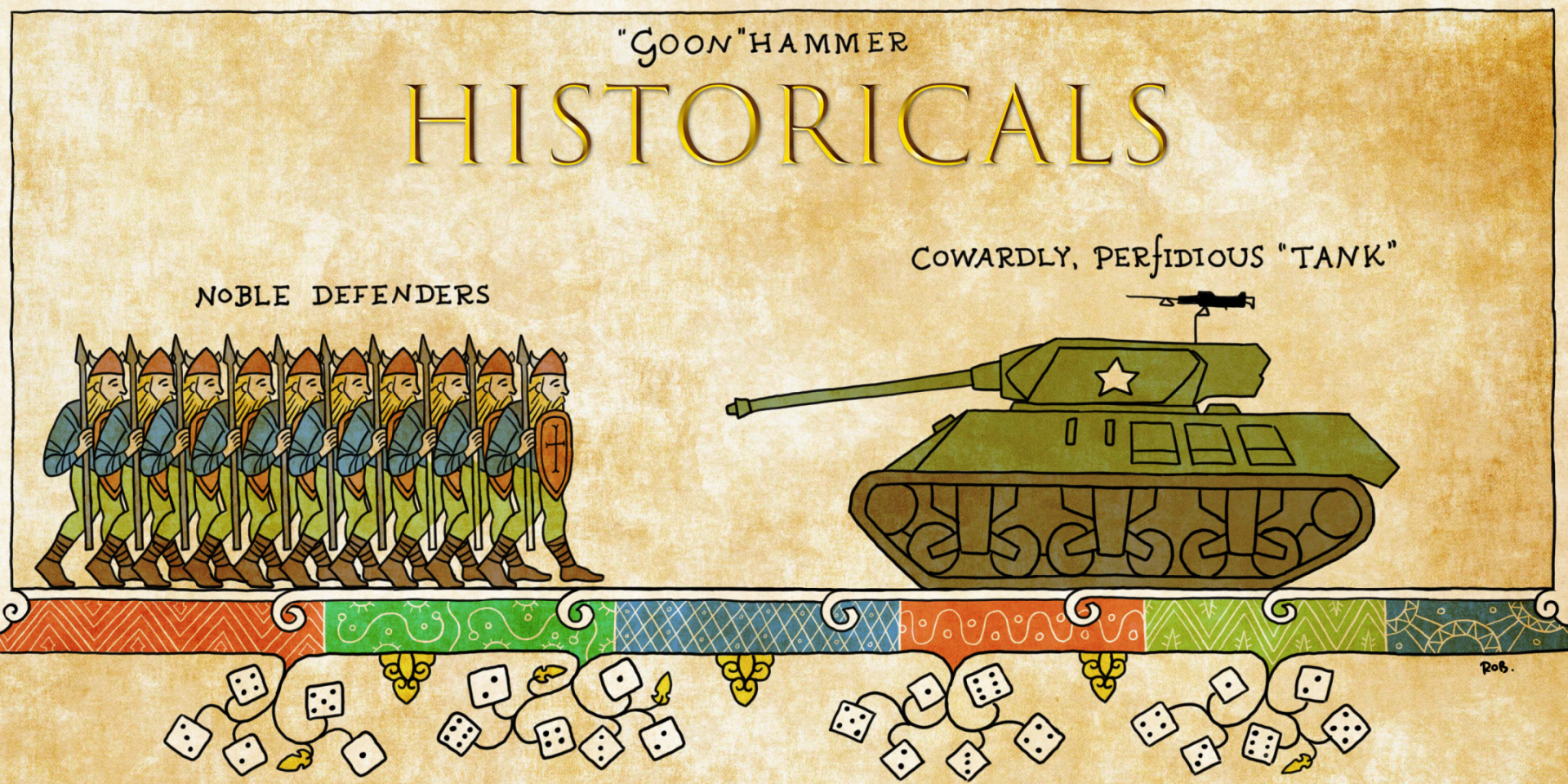A topic of recent conversation in the Historicals Hideout at Goonhammer HQ has been “when is it ok to play the baddies?” and moreover “why do you play the baddies?”. We’ve talked before about challenging and engaging with the problematic parts of history, but this question is one that we get pulled back to again and again – why do you want to play as them? This is my attempt to answer that question, and buckle in because it’s a pretty long one. There are some content warnings here, and that’s not something we do a lot of so that gives you some idea of what this article is going to be like. It’s heavy. You shouldn’t read it if you’re just here to read some fun stuff about Warhammer or what meats Greg is keen on this month or whatever. But I think it’s important, or I wouldn’t have written it. Take that as you will.
So with that out of the way, content warning: fascism, war crimes, police brutality, homophobia, the holocaust, genocide, sexism.
As a child one of my friends came from a German family and while visiting him I met his elderly grandmother. She told me about the time she served Hitler fruit cake and he was “a very polite man”. Thirty years on all I can think is how strange it is that she regaled young children with tales of Hitler. What a choice.
Now you’re probably not two steps removed, by association, with Adolf Hitler, but it’s worth remembering that you’re probably not that many more. The Nazis squat in our popular culture like cartoon villains for Indiana Jones to punch in the face, but the truth is that they were human beings, just like us, and the atrocities they committed weren’t some freak, unrepeatable other. They were the vicious, brutal extremities of an ideology that systematically denied the humanity of others, and used that dehumanising power to enact bloody horrors on millions. But they weren’t brainwashed, they weren’t unique, they weren’t different particularly from any other group who seeks to convince themselves and others that some humans aren’t humans. Plenty of those groups are around now.
The Holocaust is fundamentally the far end of the scale of such a truth about people. Despite what is sometimes said to excuse it, people in the Third Reich absolutely knew what was happening. Even if they did not know the specific details they knew that the undesirables went to the camps and never came back. The first victims of the Nazis were people in Germany itself. They watched the purges. Kristallnacht was not a quiet affair. They knew.
The Wehrmacht, their military forces, absolutely knew. Perhaps there were a scattered few who didn’t, but in truth the overwhelming almost complete majority of soldiers knew of the crimes against humanity being committed by those on their side, or they committed them personally. They excused them as not being crimes. That’s the thing about criminality – it’s all a matter of perspective. To many Germans what they were doing were acts of war, it’s just the war wasn’t just one being fought for land or resource, but for blood and people and the integrity of their national spirit. Slaughtering people in death camps was, for many, as much a part of the war effort as firing a rifle or driving tank. It’s why they were funded and staffed and resourced right up until the end. To the Nazis they were a vital front in the war.
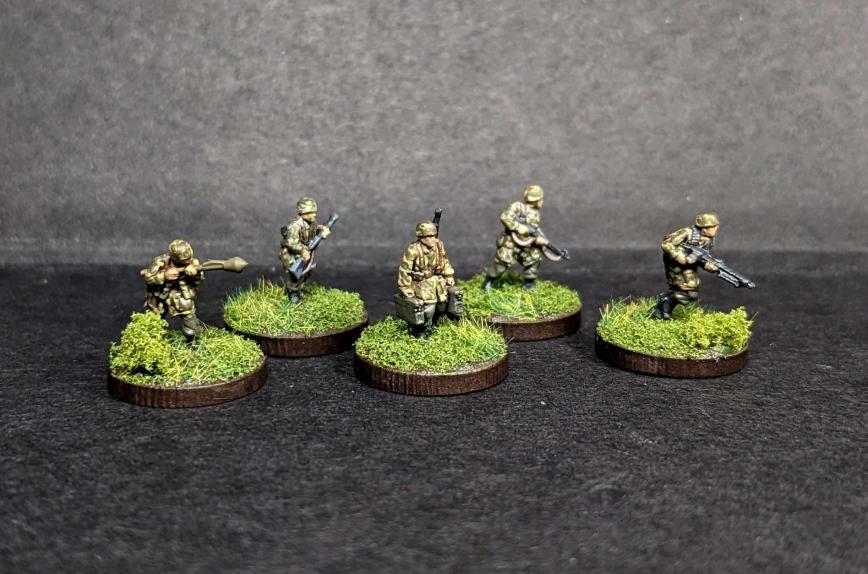
Four is the number of times over I would have been killed, if I were German, by the Third Reich. Once for being disabled, twice as a homosexual, thrice as a socialist, and four times as an “asocial”, someone who promotes values against the state and who objects to war. I would have worn a red triangle, a pink triangle, and a black triangle. There’s little doubt I would have been killed if I had lived in the Third Reich. I would have been, in the eyes of the Nazis, a righteous casualty of war.
So it is, I will admit, deeply strange, that I have spent more than a few hours in the last few weeks patiently painting intricate camouflage patterns on miniatures of Nazi soldiers.
Let’s make something clear: the German forces harboured war criminals at every level. The Clean Wehrmacht Myth is just that, a myth. There was no special specific group within their forces who committed all the war crimes. There were, however, groups who more or less only committed war crimes. But all branches and units did. To pretend otherwise is to buy into the propaganda of dead fascists.
If you don’t think deeply about the nature of fascism, if you aren’t well read into the realities and horrors of the Third Reich, then you might have less of an understanding of what painting these little war criminals means. You might have less of a personal stake, perhaps, which is an interesting form of privilege isn’t it? If you can look at these models and think of them as “just models” and think of what they’re depicted to be as just “soldiers” without having a deep spine shiver, then you’re lucky.
But I’m not. They are familiar and close – two steps of separation from Hitler. They are personal and directly threatening – four times over dead in the camps. They are understood, horribly – I have read much, and read more, desperate to understand what happened there and how it might be avoided here. And yet here I am, painting another tiny little fucking Nazi. I’ll play with them too, put them on the table, push them around, roll dice and imagine them killing and being killed.
The question of why is a good one.
I was arrested a few years ago. I’m not going to go into great detail but the arrest was spurious, no charges were brought against me, I never went to court. The whole ordeal was awful and horrible, and it was prompted by me having a seizure. My disability was the prompt for them to intervene, and this ordeal spiralled into a confusing mess of consequences for me and my family. My son, who at the time was very ill and because he was in pain and barely more than a toddler sometimes lashed out, became a focus for them. Like many parents of chronically sick children my husband and I were held under the microscope to see if we were the cause. My disability, and the reaction to it by authority, led to this chain of events that also caused a discriminatory reaction in authority towards my son’s disability and our role in it.
I will never forget that one of the questions I was asked, in a police interview, was “do you think the reason your son is violent sometimes is because you denied him a mother?” For the record, he was sometimes violent because he was a small child unable to understand or cope with the pain and stress he suffered because of his illness. But the question had been asked: do you think your son hurts himself and others because you’re gay? I was numbly horrified, later, to discover how much of the investigation had centred around this fact, that we were a homosexual couple with a child. In one report fully four pages of dense writing concerned our sexuality and its proposed “impacts”.
I knew to keep my mouth shut about anything we couldn’t avoid being seen. I didn’t make my political views known, because to even approach that would give them another stick to hit me with. I didn’t make my views on state power or violence known, because the violence was being done already and there was no need to make it clear at that stage. But I know that my politics and views would have been used as a cudgel against me – I’ve spoken to many many people over the years who have had it used against them. There’s no doubt it would be used against me in a moment of weakness like that. I’ve spoken to people who’ve experienced awful violence from the state for peaceful statement and demonstration of their views. If you’ve ever been kettled at a peaceful protest, or felt the sting of tear gas, you know what that’s like.
Once for being disabled, twice as a homosexual, thrice as a socialist, and four times as an “asocial”, someone who promotes values against the state and who objects to war.
I wasn’t killed by my experiences (though some are, every year, killed by so called liberal democracies for these things) and being arrested and having your life turned upside down isn’t the same as being sent to an extermination camp, it would be laughable to claim it. But the same impulses that drove the Nazis to massacre people en masse aren’t absent from the societies we live in today. They are more or less muted, more or less accepted, more or less normal. It’s a matter of degrees and extremity. Many people I’ve spoken to about my experiences have been horrified and outraged by them. Yet, nevertheless, they happened. Remember that when the concentration camps were liberated, many prisoners were freed. But many homosexuals were simply transferred to more “normal” prisons to serve out the remainder of their terms. The specific nature of the violence done against them was unacceptable to the Allies, but they agreed the crime of being gay demanded violent reprisal from the state.
After the end of the Second World War the Allied powers gained the upper hand. My own country, the UK, was one of the victors and because of that we held onto our colonies in many places. But over the decades those places rebelled, and wanted independence. We built concentration camps in Malay and Kenya. We’d already built a few, but we perfected the techniques in the post war years as our control over the colonies slipped. If you search the internet for the Malayan Emergency you’ll find some details on some of the horrors, and see some photos (including British officers posing with severed heads of local insurgents) that you probably don’t want to see. Many of the men who did these crimes had served fighting the Nazis. Many of the people who built the concentration camps for Britain, only a few years earlier, helped liberate the ones that the Germans had built.
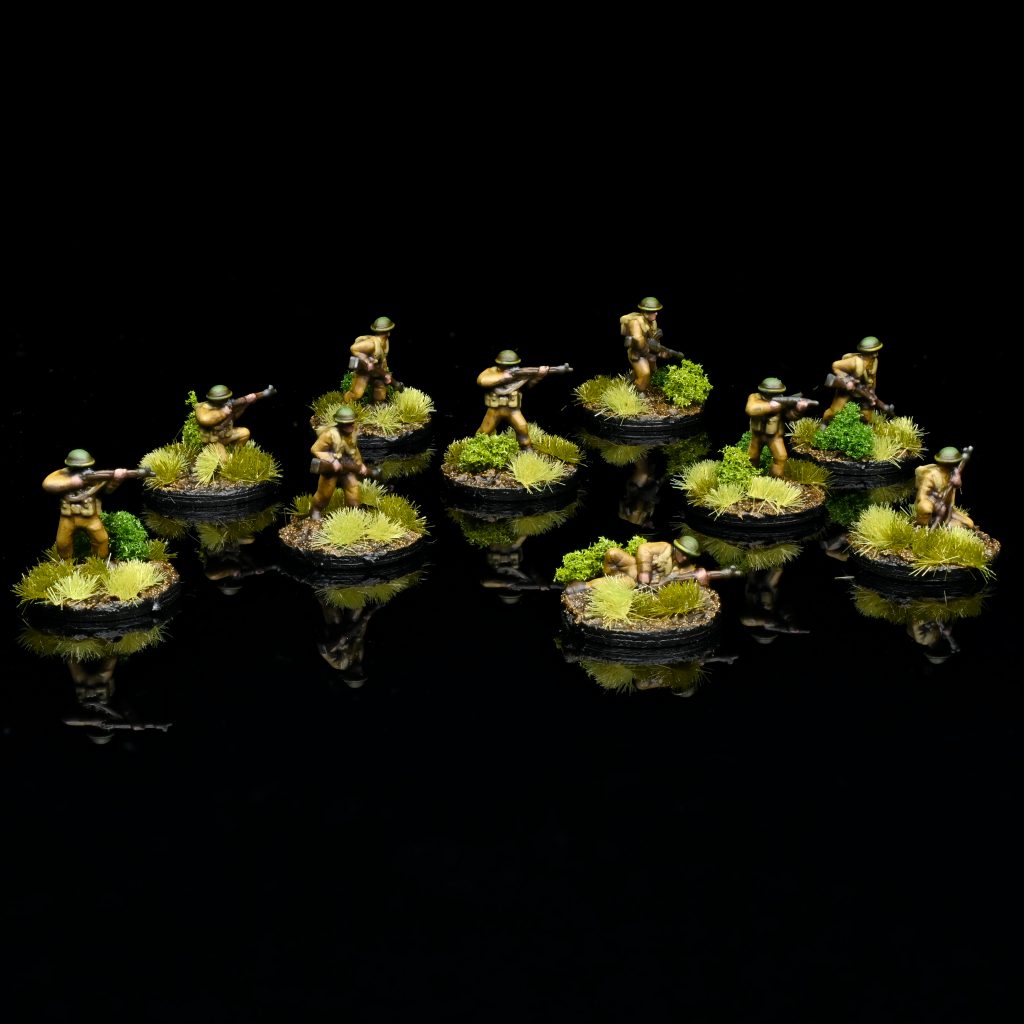
Roy Urquhart, played by Sean Connery in the film A Bridge Too Far, was my archetypical hero as a child. He was wry, confident and assured. He was brave, yet realistic, and also unnervingly witty. When I was a child, watching it with my grandfather, he was everything I aspired to. And better than being a cool character, he was a real person, an actual figure of history.
Five years after the events depicted in the film the actual figure of history was the General Officer Commanding in the Malayan Emergency, and oversaw the implementation of the Briggs plan where fully 10% of the Malaysian population was relocated into concentration camps.
When I paint a model of a British soldier, I might well be painting a tiny war criminal. Just in a different war.
If you don’t think deeply about the nature of empire, if you aren’t well read into the realities and horrors of the British one, then you might have less of an understanding of what painting these little war criminals means. You might have less of a personal stake, perhaps, which is an interesting form of privilege isn’t it? If you can look at these models and think of them as “just models” and think of what they’re depicted to be as just “soldiers” without having a deep spine shiver, then you’re lucky.
But I’m not. They are familiar and close – my grandfather sold planes to the British armed forces in Kenya and Malaysia. They are personal and directly threatening – arrested by the state because of their deep bigotries. They are understood, horribly – I have read much, and read more, desperate to understand what happened here and how it might be avoided happening again. How it might be undone. And yet here I am, painting another tiny little fucking colonial bastard. I’ll play with them too, put them on the table, push them around, roll dice and imagine them killing and being killed.
The question of why is a good one.
You might be thinking at this point “it’s ridiculous to compare the British Empire, let alone the modern British state, with the Nazis, what a melodramatic idea” and you’re right that certainly today they’re not the same, not on the same scale, not facing exactly the same horrors. You might think that what happened in Malaysia doesn’t compare to the Holocaust, but then I wonder if someone in Malaysia who lived through it would agree?
And we can’t avoid seeing some of the same horrors on a smaller scale day to day, even now. As I write this in the last few weeks some refugees have been moved from a converted carrier ship due to an outbreak of sickness, because our politicians pushed hard to house them in inhumane conditions and it all went wrong. And the big difference, right, is that they were moved. This time. The same government is pushing very hard to enact a lot of policies like that. The genocide of travellers in the UK was in the last Conservative election manifesto (no really, go read it and then go read the UN’s definition of genocide). The current major opposition party leader here in an interview the other day said that we would have to put refugees coming over in boats “in the same bracket as terrorists”. It’s chilling to watch the slide into othering and authoritarianism and all the other things that led, not very long ago, to the slaughter of millions.
How does this relate to pushing little models around on the tabletop? One of the things I get told most about historical wargaming is people wouldn’t want to play because “someone has to play the baddies”. They often mean the Nazis, because of the giant sized impact that WW2 has on wargaming and popular culture in general. Someone would have to play as the Nazis, and who would want that – who would want to play as the tiny war criminals. But remember, they’re all potentially tiny war criminals. The average American GI in 1944 was probably as bigoted as the average German soldier, just in different ways. That isn’t to pick out the Americans, it’s true of the armies of all nations.
Bigotry, dehumanisation, discrimination, and subjugation is and always has been the standard operating procedure of humanity. If you think that they are substantively different then it is because your privilege and your biases sit in different places. You have been shown different media (and yes, propaganda) your whole life. You, instinctively, value some groups more than others and so the bigotry against them is less or more acceptable to you on some deep level. Don’t take offence to this, it’s true for me too. Striving to undo those learned biases is one of the hardest and most important tasks we can undertake. Don’t take this to mean that what the Nazis did wasn’t horrifying and to be condemned, it was. Take it to mean that perhaps those horrors don’t excuse the horrors and abuses others commit.
But that doesn’t mean that we should shy away from these experiences. Play is a core part of human expression – we create and play games to engage with many cultural topics, ideas and needs. Play is an essential part of being a person, and even in the poorest, most difficult of situations people play games together. Often left alone a person will play games with themselves. And exploring these things in play is not trivialising or demeaning, it’s as valid as watching a movie about it or reading a book about it. And it’s prone to all of the same biases and occlusions and omissions for the sake of cultural comfort.
I have learned more than I thought possible by playing wargames based on history. When we were in that awful horrible period of our lives, when we were being hounded by the state out of bigotry and discrimination, I found a refuge in it. I painted tiny war criminals of every nation, and presumably some who weren’t war criminals but knew that war crimes were happening and didn’t fight back, to get myself through. I lovingly painted camouflage patterns and hull markings and the light falling on shouting faces. When I could, when I got some time, I would sometimes take those models and play games with them. We’d roll dice, and the models would die or kill and it would be an intellectual challenge I could drive myself into that didn’t feel like a lie. Because these things, these people, were and are real. Pretending they’re not is pointless.
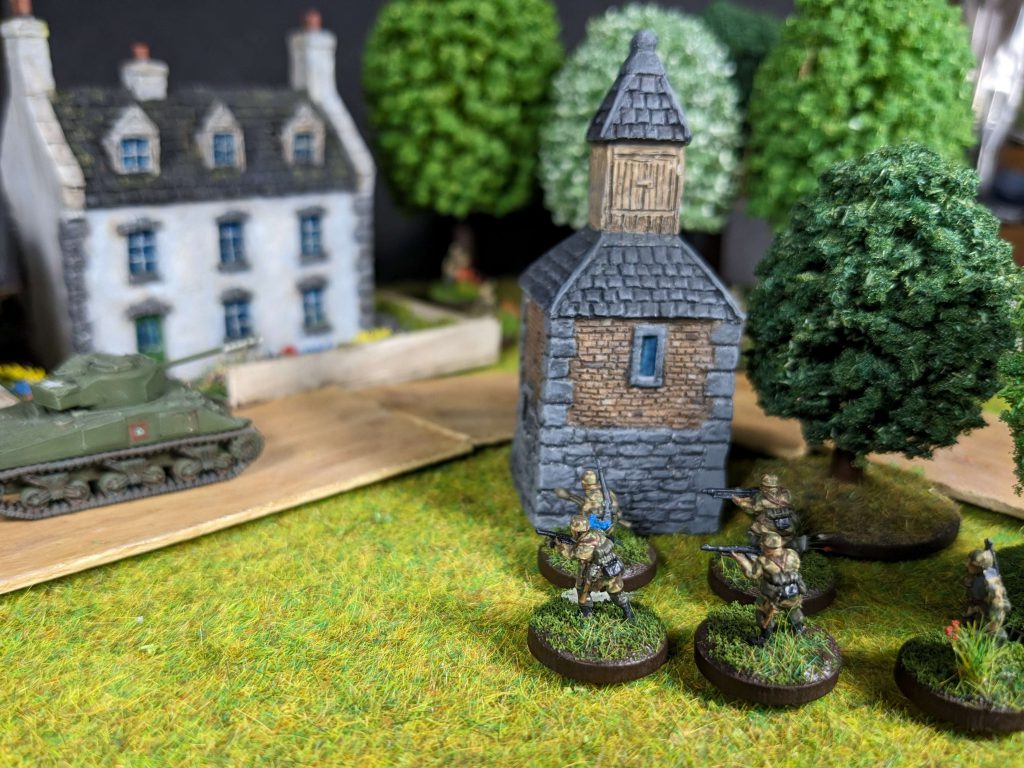
I learned a lot because as I read about these people and these places and these battles and these horrors they committed I found myself seeing the parallels, understanding my society and culture better. These horrors, these bigotries and viciousnesses, are part of our culture. To pretend otherwise is to blind ourselves intentionally to it because it’s more comfortable, because it’s easier. But through play, I found myself understanding them, my culture, and ultimately myself better.
I was surprised when I first met veterans of recent wars, in Afghanistan and Iraq, who play miniature wargames. I was more surprised that some of them play miniature wargames depicting those conflicts. But perhaps I shouldn’t have been – some of the first known war games for entertainment were played by veterans of the Napoleonic Wars when they got back. Veterans of the Second World War played games about their experiences. I’m sure veterans of other wars have too. It’s a way to process, to understand, to try and engage with a difficult complex thing and work through it.
Games are a safe space to practise something, sometimes something emotional or intellectual, to come to terms with something. They’re the ultimate safe space – if you’re uncomfortable, you can simply stop playing. Just walk out.
Historical wargames, and other wargames too, are safe spaces to explore the horrors and nightmares of war and ideology and violence. They are places to come to grips with history and reality and the impacts of what is done. That’s why good games and historical representations are so important. If you misrepresent something you falsify it, you teach the wrong lesson. It’s why I am always so aggressive in pushing back against the propaganda view of the Nazi war machine – it was not uniquely great, the soldiers weren’t amazing heroes fighting for the wrong cause, they didn’t have the best tanks of the war. If all that was true then they would have fucking won, wouldn’t they, and they didn’t, they fucking lost. We like to internalise that sides lose for moral reasons, that the Nazis lost because right wasn’t on their side.
But the truth is the Nazis lost because they had insane competing chains of command, confusion in the ranks, coercion of their own soldiers, because they obsessed over fuel guzzling unreliable super tanks, because they alienated the populations they occupied, because they directed resources away from the frontlines towards the death camps, because they were Nazis with everything that comes with that. You should see at least some of that in a good wargame. You should learn, by playing, the weaknesses and flaws of their ideology. And you should learn the weaknesses and flaws of other nations too, of other peoples, including your own.
And that’s one of the reasons why you play the baddies, however you want to categorise that: to learn, to understand, and to draw parallels and connections. You do it because it’s a safe space in which to see the consequences of a murderous genocidal stupid regime, without you having to, you know, actually participate in one. You do it because if we learn through playing, maybe when it happens again we understand it better and can stop it sooner.
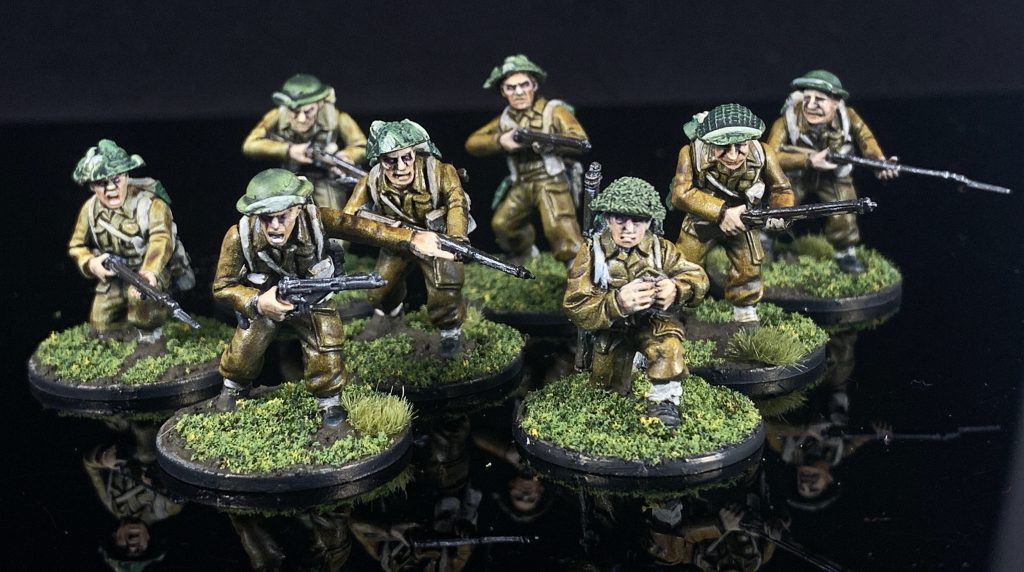
But there’s another reason. And it has to do with True Crime podcasts. You know the ones, where they deep dive into some horrifying murder for fifty episodes in excruciating detail. For reasons I couldn’t explain, a shocking number of the women in my life listen to these things. And it constantly bugged me: why would you spend your free time mired in such misery and horror? Why would you do that to yourself?
So I did the thing I’ve learned to do over the years: I asked them. I wanted to know why they listened to them. Most people couldn’t explain it, didn’t have answers I could grasp onto, I could understand. But slowly I built a picture up.
Our society, just like all societies pretty much, is hostile to women. Just for being a woman you are subject to fear and stress and danger that I, as someone who presents as a man, do not experience. I don’t walk home with keys held in my fist just in case. I don’t talk loudly on the phone to someone who isn’t there to deter people who might follow me. My boyfriend isn’t just about to get home, or just in the shower, or meeting me here in a minute. Because I don’t live in the world they do, where that danger is a constant presence, conscious or unconscious.
But switching off from that, that sense of palpable stress, isn’t easy. You can’t just flick a switch and do some escapism and have it feel meaningful. So you build forms of escapism, and any truly absorbing activity that isn’t the daily minutiae of your life can be escapism, that feels accessible and plausible given the stakes of your life day to day. I concluded, with a numb horror, that many of the women in my life listen to these podcasts because it was somewhere to put their fear and stress about their safety, and something different enough from their own lives but still familiar enough in its brutality that they could connect to it. They listen to True Crime podcasts, and for similar reasons I play wargames.
For me the fear, the stress, the palpable sense of danger, is historical and social and cultural and political. It’s the presence of the state and those who wish me harm at all times. I can’t easily connect to something where that danger and those fears are completely absent. My escapism, my fun, has to be something that feels plausible and accessible given all that, and wargaming fills that niche.
But more than accessible and plausible, a possible place for my fun given my stresses, it’s controllable and containable and I can just walk out. My friends can just turn off the podcast. The subject matter is about things that have already happened. The subject matter of my escapism has too. The thing that drove the Nazis might still lurk, but the Nazis themselves are fucking dead. They’re gone. And that means I can escape somewhere where the stakes are familiar but not as urgent. Where I can feel safe because these war criminals are gone now, so maybe we can have some fun.
That’s why you play the baddies in wargames, in the end. So you can see them, dead and on display, like a butterfly pinned to a board, and you can relax. Just a little. Just for a moment.
Questions, comments, suggestions? Get in touch at contact@goonhammer.com or leave a comment below.
